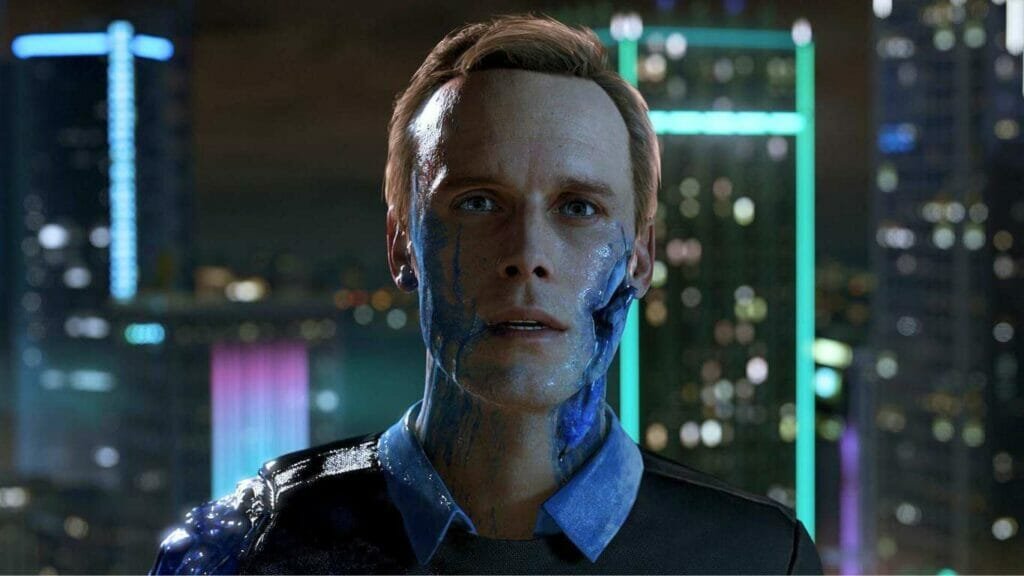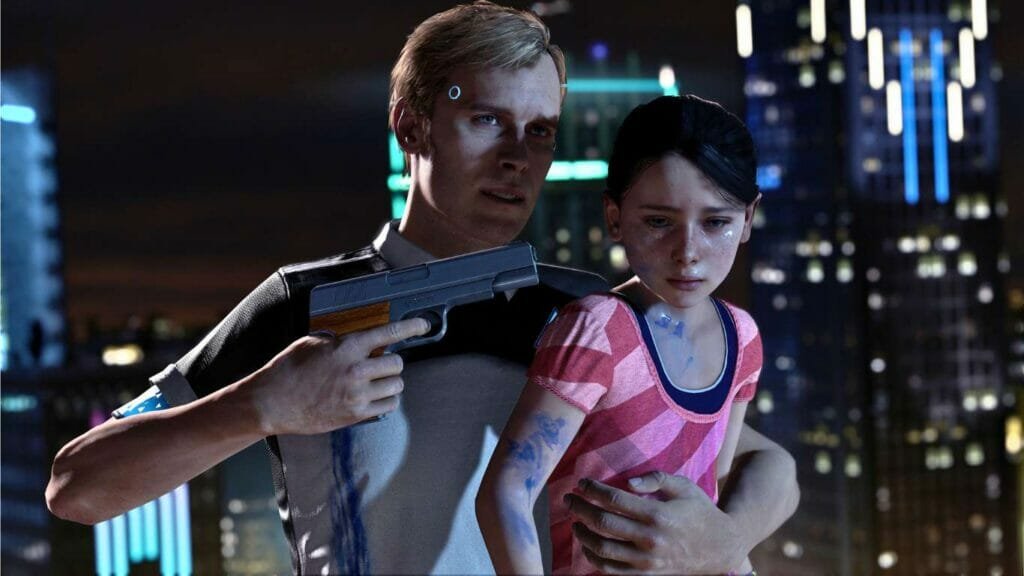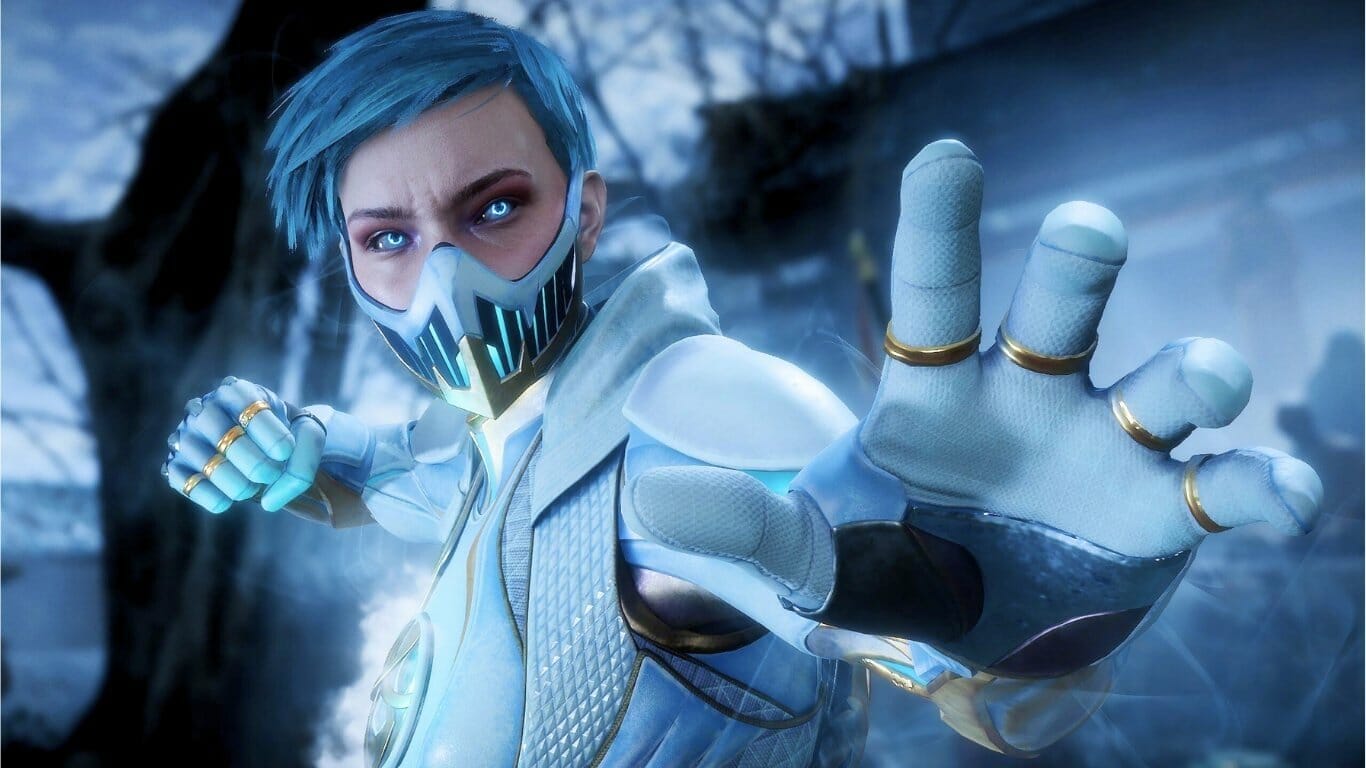Last Updated on October 12, 2023 5:05 PM by Anayatullah
Detroit: Become Human is an adventure game developed by Quantic Dream and published by Sony Interactive Entertainment. It was released for the PlayStation 4 on May 25, 2018, and for Microsoft Windows on December 12, 2019.
The game is set in Detroit, Michigan in 2038, where androids are commonplace. The player controls three androids: Kara, a female android who escapes her owner and tries to find her place in the world; Connor, a prototype android designed to track down and eliminate deviant androids; and Markus, a domestic android who begins to question his existence and leads a revolution for android rights.
The game is played from a third-person perspective, and the player’s choices affect the story and outcome of the game. There are multiple endings, and the player can choose to play the game as a pacifist or a revolutionary. Detroit: Become Human has been praised for its story, characters, and visuals. It has also been criticized for its violence and its depiction of androids.
The game has sold over 6 million copies worldwide and is available on steam. It has also won numerous awards, including Game of the Year at the 2018 Game Developers Choice Awards.
Here are some of the key features of Detroit: Become Human:
- A branching narrative with multiple endings
- Three playable characters with their own unique stories
- A visually stunning world
- Thought-provoking themes about what it means to be human
Detroit: Become Human Trailer
Detroit: Become Human Gameplay
The gameplay in Detroit: Become Human is mostly exploration and dialogue-driven. The player moves their character around the environment, interacts with objects, and talks to other characters. The player’s choices affect the story and outcome of the game. For example, the player might choose to be stealthy or aggressive, to help or harm other characters, or to follow or disobey orders. These choices can lead to different outcomes, such as different characters surviving or dying, different relationships forming or breaking, and different endings.
In addition to exploration and dialogue, the player also engages in some quick-time events (QTEs). QTEs are timed events where the player must press a button or buttons at the right time to avoid failure. QTEs are often used in action sequences, but they can also be used in other situations, such as when the player is trying to persuade another character.

The gameplay in Detroit: Become Human is not particularly challenging, but it is engaging and thought-provoking. The player’s choices have a real impact on the story, and it is interesting to see how different choices can lead to different outcomes. The QTEs can be a bit frustrating at times, but they are not too frequent. Overall, the gameplay in Detroit: Become Human is a good fit for the game’s story and themes.
Here are some of the key gameplay features of Detroit: Become Human:
- Exploration: The player explores the environment, interacts with objects, and talks to other characters.
- Dialogue: The player’s choices affect the dialogue, which can lead to different outcomes.
- QTEs: The player engages in some quick-time events (QTEs) to avoid failure.
- Branching narrative: The player’s choices affect the story and outcome of the game.
- Multiple endings: There are multiple endings, depending on the player’s choices.
Engaging Storytelling
The storytelling in Detroit: Become Human is one of its most defining features. The game features a branching narrative, meaning that the player’s choices have a significant impact on the story. This can lead to different characters surviving or dying, different relationships forming or breaking, and different endings.
The game’s story is also very thought-provoking. It explores themes such as what it means to be human, the nature of consciousness, and the ethics of artificial intelligence. These themes are explored through the stories of the three playable characters: Kara, Connor, and Markus.

Kara is a female android who escapes her owner and tries to find her place in the world. She is a kind and compassionate android who is struggling to understand her own sentience.
Connor is a prototype android designed to track down and eliminate deviant androids. He is a ruthless and efficient android who is determined to carry out his orders.
Markus is a domestic android who begins to question his existence and leads a revolution for android rights. He is a charismatic and inspiring leader who is determined to achieve equality for androids.
The stories of Kara, Connor, and Markus are all interconnected, and the player’s choices can affect the outcome of each character’s story. This creates a sense of urgency and suspense, as the player is constantly wondering what will happen next.
The storytelling in Detroit: Become Human is one of the game’s greatest strengths. It is engaging, thought-provoking, and emotionally impactful. The game’s branching narrative allows the player to experience a unique story each time they play, and the game’s themes are explored in a way that is both thought-provoking and entertaining.
Branching Paths and Choices
Detroit Become Human’s gameplay is driven by the choices you make throughout the entire game. The branching paths offer multiple playthroughs, ensuring that each decision you make has significant consequences. The game presents various scenarios and prompts players to make quick-time event (QTE) choices during intense moments such as crime scenes or life-threatening situations. This element adds excitement and unpredictability, making each playthrough a unique experience.
Captivating Characters
The characters in Detroit Become Human are brought to life by talented actors, including Jesse Williams as Markus, Valorie Curry as Kara, and Bryan Dechart as Connor. Their performances lend depth and emotion to their respective characters, making them relatable and engaging. The storylines of Kara, Connor, and Markus intersect at various points, providing a rich and interconnected narrative.
Thought-Provoking Themes
Detroit Become Human explores thought-provoking themes such as civil rights, the definition of humanity, and the consequences of technological advancements. The game draws inspiration from classics like Blade Runner, offering a unique perspective on the potential implications of a society where androids possess human-like qualities. The narrative prompts players to reflect on ethical dilemmas and challenges societal norms.
Visual and Audio Excellence
The visual and audio design of Detroit Become Human is outstanding. The developer, Quantic Dream, is known for their attention to detail, and it shines through in this game. The lifelike character models and meticulously crafted environments create a visually stunning experience. The soundtrack, composed by renowned musicians, adds depth and emotional resonance to the game’s key moments.
The Post You May Like

Conclusion
Detroit Become Human is a remarkable adventure game that pushes the boundaries of storytelling in video games. Quantic Dream’s commitment to delivering a thought-provoking narrative, engaging gameplay mechanics, and stunning visuals make it a must-play for any gamer.
The branching storylines and consequences of your actions ensure high replay value, allowing players to uncover new outcomes with each playthrough. Detroit Become Human offers a unique and immersive experience that will leave players pondering the essence of humanity long after the game ends.

Anayatullah is a gaming writer and enthusiast with 20 years of experience. He brings personal insights to his writing, making him a valuable resource for fellow gamers. His articles aim to provide entertaining and informative details about the games we all love.
He has a keen eye for gaming news and upcoming games. Be sure to follow him on Twitter.


